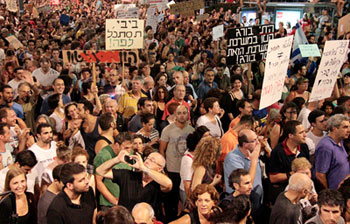

Vol. 77/No. 5 February 11, 2013

|
| Gerrit De Vynck |
| Aug. 6, 2011, protest in Tel Aviv, Israel, against high price of housing and cost of living. |
Prime Minister Benjamin Netanyahu called the elections nine months early after members of his coalition government balked at approving new spending cuts and tax hikes. The result: his Likud-Beiteinu party lost 11 seats, dropping from 42 to 31, though still the largest single bloc.
The vote reflected growing dissatisfaction with the social consequences of the deepening capitalist crisis: assaults by bosses on workers’ wages and the expansion of temporary jobs, along with rising prices, tax increases and cuts to social spending, affecting working people and layers of the middle classes.
Contrary to the common radical-liberal view of Israel as a special, isolated island of growing reaction in a sea of Arab revolt, the elections provide additional proof that Israel is part of the Middle East and the unfolding social changes set in motion by the Arab Spring—which has created new openings in the entire region for working-class struggles and a fighting alliance of workers and farmers.
For months leading up to the election, Netanyahu beat the drums on the need to strike Iran before the government there obtained a nuclear weapon, banking he would get his third term on the “existential threat.” It got little traction, showing that most Israelis don’t feel threatened.
In a television ad, Yair Lapid, leader of the Yesh Atid party, poked fun at Netanyahu’s speech at the United Nations last fall in which the prime minister held up a cartoonish drawing of a bomb, and harped on the impending danger from Iran’s nuclear program. Lapid held up a similar drawing depicting the middle class as the bomb and the high cost of living as the fuse.
Yesh Atid (There is a Future)—a capitalist party formed shortly after unprecedented protests against rising prices and housing costs swept Israel in 2011—came in second with 19 seats. Lapid, a former TV news anchor, campaigned on the issues of affordable housing, ending exemptions from military service for the ultra-Orthodox haredim and urging a resumption of talks with leaders of the Palestinian territories.
An article by David Remnick in the liberal weekly New Yorker on the eve of the election was typical of the pundits. He predicted that openly anti-Arab and racist Habayit Hayehudi, Jewish Home party, would come in third, adding that “second place is not inconceivable.”
Instead, Jewish Home, which calls for annexing to Israel Jewish settlements in the West Bank, squeaked by into fourth place, even though it increased its seats to 12.
The Labor Party, a bourgeois social-democratic party, came in third, jumping from 8 to 17 seats. It campaigned mostly around the high cost of living.
Under Israel’s parliamentary system, the party that wins the most seats has the first opportunity to try to form a new government. Netanyahu has already invited Lapid to join his coalition.
Worried that Palestinian citizens of Israel would boycott the contest, Haaretz prior to the election printed an editorial in Hebrew and Arabic, an unusual move for the Hebrew-language daily. “Massive Arab turnout in this election would serve all those who aspire to democracy in this country, Jews and Arabs alike,” the paper said. Palestinian Arabs make up 20 percent of Israel’s population.
Voter turnout among Israeli Jews was 66.6 percent, the highest since 1999. While initial reports said Arab turnout was “lower than ever,” in the end it reached 56 percent, slightly less than in 2006, but more than the 53.4 percent turnout in 2009.
The three main parties based mostly among Israeli Palestinians—the United Arab List, Hadash, and Balad—won a total of 11 seats. “Each of the three parties enjoyed an increase of several thousand voices,” reported Haaretz, “thanks to Jewish voters.”
“Netanyahu will probably be able to forge a ruling coalition with Lapid’s party, but it is likely to be a coalition less driven by the ambitions of ideological West Bank settlers or the burgeoning Israeli far right,” writes Scott McConnell in the American Conservative.
None of the main Israeli parties consider inviting the Arab-based parties to join their bloc in the Knesset. The exclusion of Palestinian parties from the ruling coalition “is more or less an axiom of Israeli political life,” McConnell writes. But, he said, “that can change, as it has in America … something like that could happen sometime down the road.”
Front page (for this issue) |
Home |
Text-version home